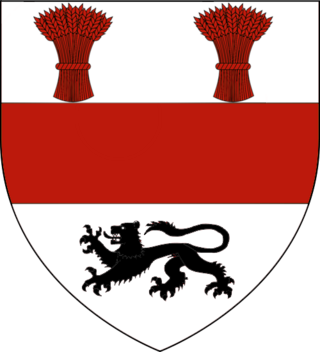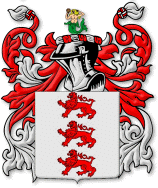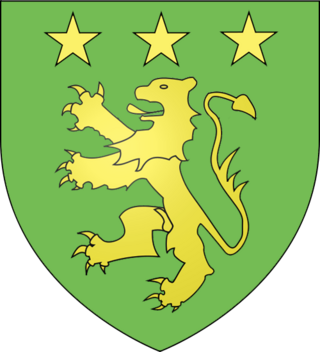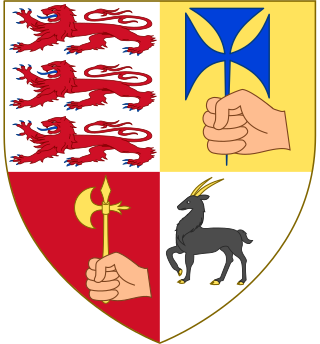Related Research Articles

Ballinasloe is a town in the easternmost part of County Galway in Connacht. Located at an ancient crossing point on the River Suck, evidence of ancient settlement in the area includes a number of Bronze Age sites. Built around a 12th-century castle, which defended the fording point, the modern town of Ballinasloe was "founded" in the early 13th century. As of the 2016 census, it was one of the largest towns in County Galway, with a population of 6,662 people.
O'Callaghan or simply Callaghan without the prefix is an Irish surname.
Lynch is a surname of English and Irish origin.

Irish clans are traditional kinship groups sharing a common surname and heritage and existing in a lineage-based society, originating prior to the 17th century. A clan included the chief and his patrilineal relatives; however, Irish clans also included unrelated clients of the chief.

Kinsella is a surname of Irish Gaelic origin, developed from the original form Cinnsealach, meaning "proud". The Kinsella sept is native in part of the modern County Wexford in Leinster, a district formerly called the Kinsellaghs. The oldest documentary mention of the surname appears in the Ancient Records of Leinster, dated to 1170, where the son of the King of Leinster is named as Enna Cinsealach. Originally pronounced KIN-səl-ə, it is also often found pronounced kihn-SEL-lə. This surname is most often found in Ireland, Northern Europe, Australia and New Zealand.
O'Dea, is an Irish surname derived from Deághaidh, the name of a tenth-century clan chieftain. According to historian C. Thomas Cairney, the O'Deas were one of the chiefly families of the Dal gCais or Dalcassians who were a tribe of the Erainn who were the second wave of Celts to settle in Ireland between about 500 and 100 BC.

The name McInerney is of noble Irish origin where it is found in the modern Irish form of Mac an Airchinnigh and in the old and literary forms of Mac an Oirchinnigh and Mac an Oirchindig. The pronunciation of Mac an Oirchinnigh led the name to be sometimes anglicised as McEnherheny in Irish documents from the 16th–19th centuries. The name translates to "son of the erenagh" in Irish, literally meaning "son of the Lord of church lands". Airchinneach may in turn derive from the twin components of air ("noble") and ceann ("head"), therefore meaning a 'noble-head' or 'Lord', denoting its aristocratic status in medieval Ireland. The coat of arms is three red lions passant, and the motto is Veritas, meaning "Truth". In some places, the motto can be found as Vincit Veritas, meaning "Truth Conquers", or "Truth Prevails".

Moore is a common English-language surname. It was the 19th most common surname in Ireland in 1901 with 15,417 members. It is the 34th most common surname in Australia, 32nd most common in England, and was the 16th most common surname in the United States in 2000.

The Diocese of Clonfert is a Latin Church diocese of the Catholic Church in the western part of Ireland. It is in the Metropolitan Province of Tuam.
Moloney is a surname of Irish origin. Its Irish translation is Ó Mhaoldomhnaigh of Ni Mhaoldomhnaigh (female). This Irish surname is of true Gaelic stock and is seldom found with the original prefix 'O'. According to historian C. Thomas Cairney, the O'Molonys were one of the chiefly families of the Dal gCais or Dalcassians who were a tribe of the Erainn who were the second wave of Celts to settle in Ireland between about 500 and 100 BC. They were a powerful Dalcassian sept who were Chiefs of Kiltanon near Tulla in County Clare, spreading to the adjoining counties of Limerick and Tipperary, where today they are to be found in their greatest numbers.

The O'Toole family of County Wicklow, formerly one of the leading clans of Leinster, descended from Tuathal mac Augaire, King of Leinster, of the Uí Muiredaig branch of the Uí Dúnlainge dynasty.
Ballinasloe GAA is a Gaelic Athletic Association Gaelic football and hurling club located in Ballinasloe, County Galway, Ireland.

Donegan, most commonly refers to a Gaelic Irish clan from Munster. The name is diminutive of Donn which means, "the Dark One", or in modern Irish, "brown", referring to hair colour. The most prominent dynasty were an Érainn people of the Múscraige and provided a King of Munster in the 10th century in the form of Flaithbertach mac Inmainén. Much later, the family provided the Dungan Baronets and two Earls of Limerick, the most notable of which Thomas Dongan, 2nd Earl of Limerick was a Governor of New York.
Mac Maoláin Gaelic-Irish surname.

The O'Kennedy family, sometimes Kennedy, were an Irish royal dynasty, a sept of the Dál gCais, founded in the Middle Ages who were Kings of Ormond. Their founder was the nephew of High King Brian Boru (1002–1014). The name Cinnéide belonged to Brian Boru's father Cennétig mac Lorcáin, King of Thomond, in the tenth century AD.. The Kennedys did not descend directly from Brian Boru, but from Cinnéide's eldest son Donncuan. Donncuan's son Mahon was the first to call himself Ó Cinnéide which is Irish for grandson of Cinnéide.
O'Casey is a common variation of the Gaelic cathasaigh, meaning vigilant or watchful, with the added anglicized prefix O' of the Gaelic Ó, meaning grandson or descendant. At least six different septs used this name, primarily in the Counties of Cork and Dublin.
Ó Cobhthaigh is a Gaelic-Irish surname, generally anglicised as Coffey, Cofer, Coffer, Copher, Caughey, Coffee, Coffie, Coughey, Cauffey, Cauffy, Cauffie, Coffy, Coughay, Coffay, Coffeye, Couhig and many more.
Ó hÍceadha is a surname of Irish origin. According to historian C. Thomas Cairney, the O'Hickeys were one of the chiefly families of the Dal gCais or Dalcassians who were a tribe of the Erainn who were the second wave of Celts to settle in Ireland between about 500 and 100 BC.

Ó Maoilriain is an Irish Gaelic clan based in what is today County Tipperary and County Limerick. The clan claims descent from Cathair Mór of the Laighin, but they first appear in the historical record in the 15th century in the kingdom of Thomond. John O'Donovan claims they are distinct from the Ryan clan which ruled Uí Dróna in what is today County Carlow.

The McGrath family is an Irish clan. The name is derived from the Gaelic Mac Craith, recorded in other written texts as Mag Craith, Mag Raith and Macraith, including the Annals of the Four Masters and the Annals of Ulster. McGrath is a surname of ancient Irish origin, and is borne by the descendants of a number of septs, each with a common origin in the Kingdom of Thomond, a kingdom that existed before the Norman invasion and was located in north Munster.
References
- ↑ Cairney, C. Thomas (1989). Clans and Families of Ireland and Scotland. Jefferson, North Carolina, United States, and London: McFarland & Company. pp. 61–69. ISBN 0899503624.
- House of Names